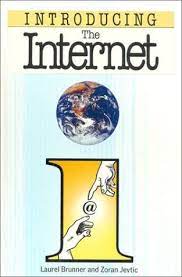This is a quick summary of how my first book got published in 1997. It’s a story of great success and it’s a story of why I cannot get anywhere today.
It began in 1996 at a time when I believed unwaveringly in my life, my marriage and my ability to achieve just about anything. Red ribbons all round. My then husband had gone up to town for a meeting about websites or some such. He came home with the information that some guy would be sending me a letter about a book. “He asked us to write it as well as doing the website. We said you might be a better choice, because you write about technology.” “Oh” says I, “thanks” says I, adding that “I can’t do anything at the moment because I’ve got too much on.” Over supper then-husband said the Icon Books guys were interesting and that he enjoyed dealing with bright people. He said that they were pleased to hear that I was a journalist.
Two days later an envelope came in the post. It contained a compliment slip that said “further to our chat with Todd …”. There was also a cheque for £1500 and a contract for a book tentatively called The Internet for Beginners. The text was to be delivered in six months time. I think it was six months. There was a lot of words in the contract and stuff about royalties and translation rights and territories and so on. I read it carefully and it seemed reasonable enough. It really had no special meaning for me, it was just another commission. My biggest concern was delivering however many thousands of words they wanted within their deadline. It would mean real research, lots more reading than I usually bothered with and much time devoted to a single project. That was far from my usual habit of writing short articles following a loose brief and to a deadline. This internet project had serious potential to get very dull.

Deadlines are the only way that stuff gets done, so needless to say I didn’t start writing Introducing the Internet until about a month before the text was due, and that was only because I had nothing else to write that was more distracting. The book’s editor was Richard Appignanesi and the illustrator was Zoran Jevtic. Fortunately all the reading paid off and the manuscript was delivered on time. 10,000 copies were printed and immediately another 10,000 flew off the press. Impressive I thought, that so many people wanted to know about the internet and the Worldwide Web. Embroiled in the miseries of the end of what had once been such happiness, I gave the book no further thought. But then royalty statements and cheques started coming it. Translation rights and sales, all that. Still, wallowing in cold sorrow and an uncertain reality, none of it meant much to me. I did press interviews acknowledged reviews, spoke on the BBC, all in a dark sad haze distinguished only by its depth and persistence.
It is only in the last couple of years that I have come to appreciate just how unique my experience with Icon was. They did offer to publish whatever else I fancied but the person making the offer was such a serious sleazeball I didn’t bother. The book spent time in the Sunday Times nonfiction chart and was translated into various languages, so it was undoubtedly a success. I forgot about the book altogether until recently. Looking at it again, given how old it is, it surprisingly still works.
More recently, after slogging away with the odious crowdfunding process, Unbound published my first novel in 2019. Thank you Unbound for that and all the fish. Unbound’s marketing and author engagement can best be described as derisory, so it is unsurprising that The Draftsman has sunk without a trace. What a contrast to the internet book. Now I look back in amazement at my experience with Icon and their …for Beginners series and wonder how it happened. But I know how: as a jobbing writer at a time when publishers sought out authors, I was lucky. And so were Icon. That is how these things work. Today the world of authoring is a much more crowded one and the serendipity that brought together Icon Books and Laurel Brunner is infinitely more random. Maybe that’s why life as a writer has these days become so weird. But weird is good. It’s how we spot the normal, at least what might be.